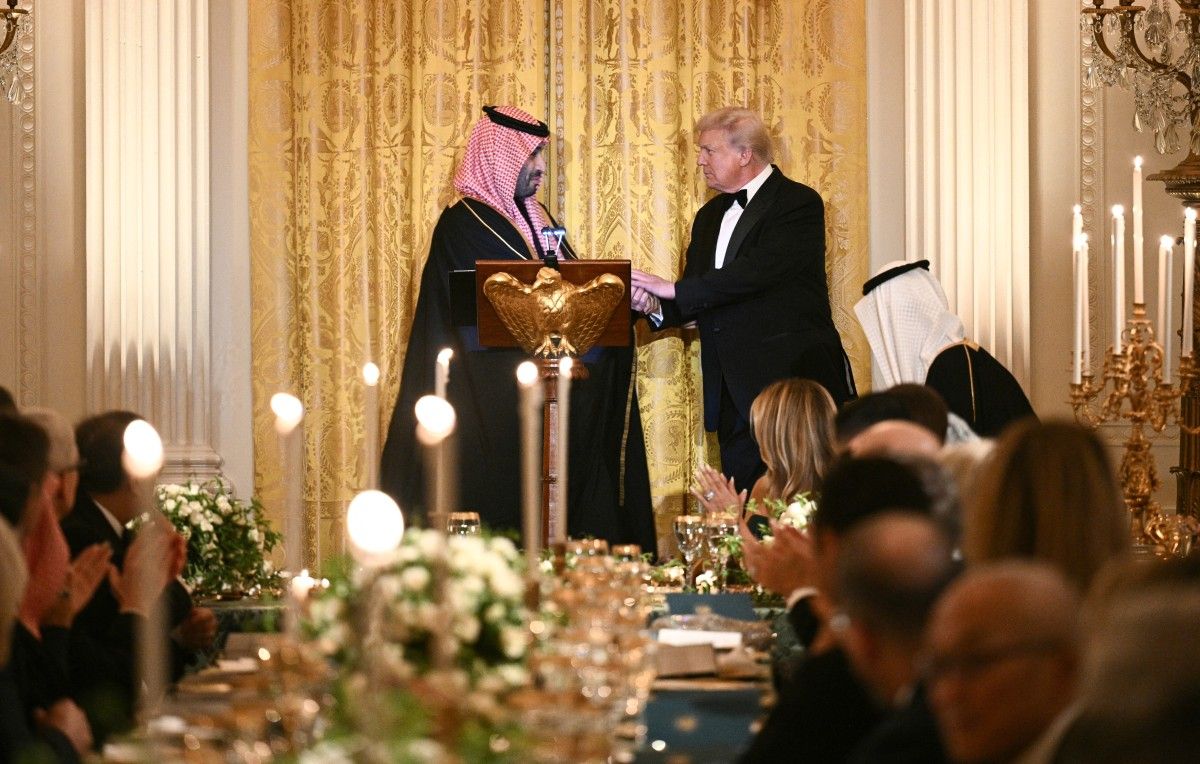- Home
- Middle East
- Nuclear Partnership and F-35 Sale Cement Saudi Arabia’s New Non-NATO Ally Status

US President Donald Trump shakes hands with Crown Prince and Prime Minister of the Kingdom of Saudi Arabia Mohammed bin Salman during an official dinner in the East Room of the White House in Washington, DC on November 18, 2025. ©Photo by BRENDAN SMIALOWSKI / AFP
The United States and Saudi Arabia announced a series of significant agreements spanning civil nuclear cooperation, advanced weapons sales, and strategic defense coordination during Crown Prince Mohammed bin Salman’s high-profile visit to the White House. The meetings marked the Saudi leader’s first official White House visit in more than seven years and signaled a renewed tightening of ties between Washington and Riyadh.
Nuclear Cooperation and F-35 Deal Approved
According to a White House statement, both nations formalized a joint declaration on civil nuclear energy, laying the groundwork for what officials described as a “decades-long, multi-billion-dollar partnership” built on stringent nonproliferation commitments. The agreement is expected to facilitate U.S. technological support as Saudi Arabia expands its nascent nuclear program.
President Donald Trump also approved a major defense package that includes future deliveries of U.S.-made F-35 fighter jets, a move that would make Saudi Arabia the first country in the Middle East outside Israel to operate the stealth aircraft. The Saudis additionally committed to purchasing 300 U.S.-manufactured tanks, underscoring the expanding scope of military cooperation.
Designation as a Major Non-NATO Ally
During a black-tie dinner at the White House, Trump announced that the United States would formally designate Saudi Arabia as a major non-NATO ally, a status that grants privileged access to military cooperation and economic benefits.
“We’re taking our military partnership to even greater heights,” the president said during remarks alongside the crown prince. Only 19 countries currently hold the designation.
The White House later confirmed the signing of a Strategic Defense Agreement, which officials said strengthens deterrence across the Middle East and improves access for American defense industries operating in the kingdom. However, the arrangement stops short of the full treaty-level guarantees Riyadh had initially pursued.
Talks on Gaza, Regional Security, and the Abraham Accords
Trump praised Mohammed bin Salman for what he described as the prince’s role in facilitating last month’s ceasefire in Gaza. He also announced that Saudi Arabia would likely join the U.S.-led Board of Peace, a new international mechanism approved by the UN Security Council to oversee Gaza’s administration through 2027.
The president additionally highlighted progress on Saudi-Israeli normalization, stating he received a “positive response” from the crown prince on potentially joining the Abraham Accords. MBS, for his part, reiterated that Riyadh’s participation hinges on securing a credible path toward a two-state solution, a condition Saudi Arabia has maintained publicly for years.
Khashoggi Murder Resurfaces in Oval Office Exchange
The issue of journalist Jamal Khashoggi’s 2018 assassination resurfaced prominently during an Oval Office press availability. Trump defended MBS, stating the Saudi leader “knew nothing about it.”
The controversy did little to dampen the ceremonial welcome extended to the visiting leader, who arrived to military honors, a cannon salute, and a flyover by U.S. aircraft.
Massive Investment Pledge and New Economic Partnerships
Mohammed bin Salman pledged to increase Saudi investment in the United States to $1 trillion, up from a $600 billion commitment made during Trump’s 2017 visit to Riyadh. The crown prince did not provide a timeline for the expanded investment, which would represent one of the largest foreign financial commitments to the U.S. economy.
American and Saudi officials also signed a memorandum of understanding on artificial intelligence cooperation and a framework agreement on critical minerals, reflecting the kingdom’s efforts to diversify under its Vision 2030 initiative. However, analysts note that mobilizing $1 trillion in new investment may be challenging given Riyad’s multibillion-dollar domestic megaprojects, some of which have already exceeded projected budgets.
Read more



Comments